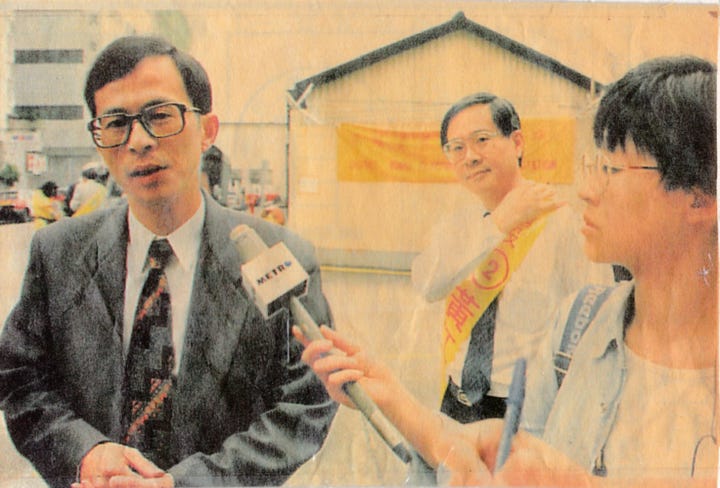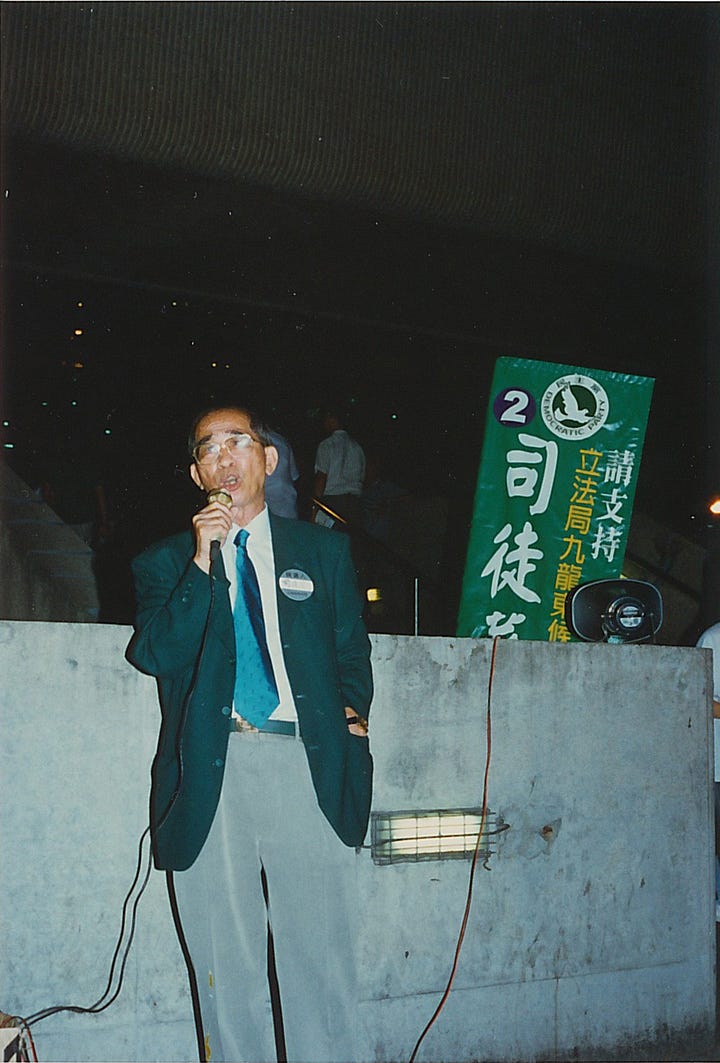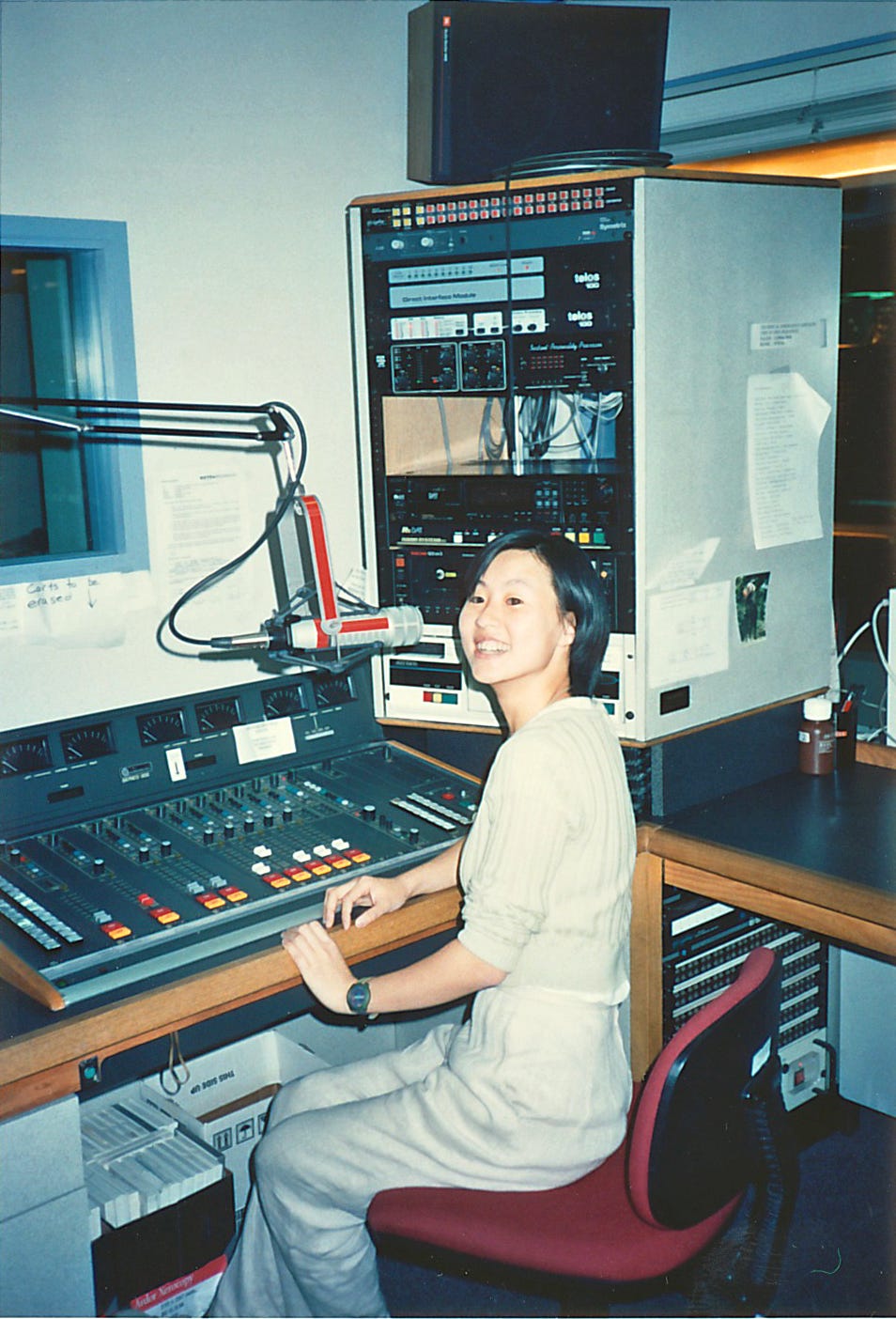Life as a Cadet Reporter in Hong Kong
Flashbacks to my first job out of college in the early 1990s
Dear Ponders,
Recent conversations with friends and the intense political developments in the U.S. have made me reflect on the early part of my career as a political reporter in Hong Kong and China.
I realized that I’ve never, or rarely, mentioned that part of my life in my posts. So today, I’m going to let you in on some of the most exciting snippets of my career.
My first job out of college was a radio reporter in Hong Kong. I had just graduated with a journalism degree from the University of Wisconsin - Madison. My studies were made possible thanks to a full scholarship from the Hong Kong Government, specifically, the highly competitive Sir. Edward Youde Memorial Scholarship.
A U.S. bachelor’s degree in the early 1990s carried substantial weight in the job market in my hometown. As the locals said, I was one of those lucky ones who had been “submerged in salt water” (meaning, immersed in foreign culture). My ability to master both English and Chinese was considered a premium skill. As such, I was hired as a bilingual radio reporter at a higher salary than other reporters who worked for either the Chinese or English channel. This title was one of only two at the radio station that signed me on.
When I was in journalism school, I chose to study print journalism. So landing on a job in broadcast journalism was not my plan. A good friend from my college, Frances, started working there a few months earlier. Thanks to her recommendation, it was an easy hire. Still, I was surprised that I actually passed the voice test. I cringed at hearing my own voice. I believed I had a Mandarin accent to my Cantonese, and a Cantonese accent to my English. But my application was accepted. I was welcomed with a metaphorical warm embrace (“metaphorical,” because hugging was still not a custom back then).
Voice Editing Crash Course
On the first day of my job, my boss Philip and his assistant taught me how to make recordings in the studio on a master tape. Then I spent hours learning how to cut portions of the tape and paste them together. This was the time before digital voice recording existed, so I’m talking about physical master tapes and scotch tapes. We worked until 3 a.m., until all of us sat on the studio floor, exhausted.
Once I graduated from the voice editing crash course, I was on my way to my first reporting assignment.
I don’t remember what my very first assignment was. But I remember the newsroom assistant Molly handing me stacks of paper with squares on them to fill out a maximum 120 Chinese characters for each story. I was also given a Sony DAT (Digital Audio Tape) recorder, along with a professional microphone adorned with the station’s logo, a bunch of tapes and two spare battery packs. My reporters’ bag weighed about 12 pounds. Carrying it was a good daily workout and made one of my shoulders chronically sore.
An immediate challenge was to learn how to read and write down the counter on the DAT recorder every time I encountered a usable sound bite, and then rewind the tape and play it back so I could send the sound bite to the station via the phone line.
Killing Two Languages with One Tongue
Another challenge was to perform code switching at high speed. This meant that I was expected to translate a story from English to Cantonese and vice versa on the spot, and send the story to the station as soon as a breaking news or press conference had happened.
Sometimes, if the interviewee could speak both languages, I had to ask questions and record sound bites in both. The most extreme case was reporting from the floor of the Legislative Council hearings. I plugged my recorder to the simultaneous interpretation channel while I listened to the original language in real time. My head would explode after each of these intense sessions.
Not two months had passed since I started my job, was I assigned to report on the very first democratic elections of the city. You see, the British colonial rule was about to end, and everyone was worried that there would not be any freedom for the people of Hong Kong after Communist China took over its sovereignty came 1997.
Our last British Governor, Chris Patten, was very much intuned with the public sentiment. He decided to introduce democratic elections on the local level--District Councils. His goal was to establish a foundation for local folks to govern themselves, under the new constitution for the city, known as the Basic Law. This mini constitution was agreed upon by both China and the UK in the Sino-British Agreement on the future of Hong Kong.
I had great respect for our last governor. He was friendly, sympathetic and straightforward, often speaking his mind even though the Chinese government wasn’t pleased with his ardent advocacy for the Hong Kong people.
It remains a mystery that my news editors would choose me, a cadet reporter, to be stationed at the Government House almost daily and report on what Gov. Patten had to say. To help you understand what my role was, imagine I was among the White House press pool. What I did was equivalent to that, but at a much smaller scale. I suspect that my bilingual skills appealed to my bosses, as I could fulfil the roles of two reporters, killing two languages with one tongue.
The First Democratic Elections


On the day of the much-expected District Council elections, I was given an assignment to report my observations on the ground. It was early in the morning. There was barely a soul, and the poll stations were mostly empty. I hung around, waiting for things to happen. Suddenly, I got a call from my assignment editor, yelling at top volume, “Where the hell are you? Why didn’t you call in for the top story of the hour?”
“I didn’t know I had to send a story. Nothing was happening,” I reasoned.
“Don’t give me that crap. You should’ve reported that only two or three kittens (slang for “people”) showed up at the poll station.”
I was given a good scolding before my boss hung up.
With such harsh verbal punishments, it took no time for me to sharpen up my reporter’s antenna. I became really fast with my reporting. On some days, however, I was a few seconds late because I had to gather both my English and Chinese scripts before I called the station with a new story. That few seconds cost me the top spot of the news cast, which meant that we lost to our competitors. A scolding ensued, and I had to try to be even faster.
China-Bound
A few months into my job, I was given a very short notice to pack for a short trip to Beijing to cover some top-level meetings between the Chinese and British Governments. It came as a surprise, and I felt unprepared. Fortunately, they sent me to work alongside a more experienced coworker, Mo, who was only four years my senior but appeared way more worldly than me. She would be my go-to Mama Hen whenever I didn’t know what to do in my first trip back to my country of birth after I fled it with my family 18 years earlier.
Before heading North, I had to get a special passport for China. Under my passport photo, my name and my profession as a reporter were handwritten in neat Chinese characters. Why was my profession included? I wondered. It turned out to be an important detail for Chinese spies to keep an eye on my behavior.
In the next installment of my newsletter, I’ll share my experience as a reporter in Beijing. My stories will include a brief encounter with Chinese spies, a scramble to cover a mass shooting, top-level negotiations between China and Taiwan, and more. Stay tuned.





Sounds like a very stressful job! Love the old tech gear and pictures of the younger you! 😊
I loved learning about your early career as a reporter in Hong Kong and having to learn to be such a quick, on the ground radio reporter working in two languages at once! Very impressive but no doubt very challenging too. It reminds me of my early newspaper reporter career, the Adrenalin of the reporting and urgent deadlines to write fast to make it to my editor ‘before the presses ran,’ (as this was the 80s). I learned a lot from those days and particularly how to analyze situations quickly, write quickly, and make deadlines. Skills that served me well the rest of my career. Can’t wait to read your next installment!